Men's magazines: an A to Z
Men's magazines, lad's magazines, men's fashion and lifestyle, glamour magazines, girlie magazines, pin-up magazines and top-shelf magazines are profiled on these pages alphabetically. This pages covers Carnival to Cut via Club, Clubman and Cosmo Man. On other pages:Introduction
- 3D titles to Boys Toys
- Carnival to Cut (this page)
- Deluxe to Esquire
- Fable to Front
- The Gentleman's Magazine to The Humorist
- Ice to London Opinion
- Man to Maxim
- Mayfair to Monkey
- Nine to Playboy
- Razzle to Stuff
- T3 to Zoo Weekly
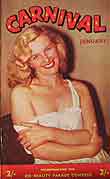 The January 1956 Carnival cost 2/- for 56 pages. Shirley Ann Field featured in 5 pages |
Carnival [closed]Liverpolitan Ltd, Birkenhead, 1955-1958?; City 1965-1970?; Williams; monthlyOriginally, Carnival was a pocket-sized pin-up magazine that featured some topless images. A regular feature was a 'beauty parade contest' in which readers voted for the best photographs sent in. The prize was £50 (doesn't sound a lot now, but would have been a month's wages). Voting was done on a postage-paid postcard that was tipped-on the contents page. A similar idea was used for FHM's High Street Honeys 40 years later. |
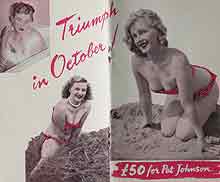 Note the spot red on the 'beauty parade contest' winner |
Full colour at this time was rare because it was expensive, and also the skills and materials needed were in short supply (rationing only ended in 1954). For its first year, Carnival used spot red on the cover for its masthead, and to pick out the lips and bikinis of the models on its centre four pages. Photographer Russell Gay wrote a five-page feature in January 1956 issue posing the model. That year, colour covers became the norm. |
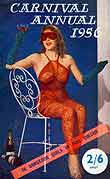 A Carnival annual and Rhapsody in Colour with 100 pages, below 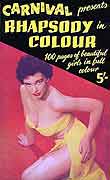 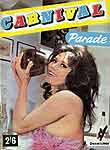 Carnival Parade in 1965 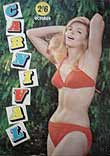 October 1967 Carnival for 2/6. Published by City 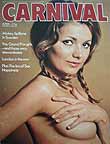 April 1974 Carnival at 35p (7/-) |
Carnival also ran special issues, such as a 1956 annual (2/6) boasting '26 gorgeous girls in full colour', and in 1957 produced a spin-off, Rhapsody in Colour, which was an all-colour special for 5/-, more than twice the price of the monthly.
What happened to Carnival after 1959 is unclear. The title seems to disappear from the scene by 1960. However, the name was back on the streets in 1966 from City Magazines.City published Men Only and the weekly Parade in the 1960s. In 1965, Parade Carnival was published in a sub-A4 format. By December of the same year, Carnival Parade appeared. A standalone monthly Carnival was certainly published with a February 1966 cover date. By 1974, City had folded and Carnival was published by Williams. |
|
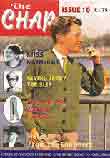 Knitted cardigans and pipes are essential accoutrements in the faux nostagalic world of The Chap (issue 10) |
The Chap1998-The Chap is a 'satirical magazine for modern gentlemen' that harkens back to an era of pipes, slippers and knitted jumpers. Its readers gather, wearing tweeds, deer-stalkers and plus-fours, to protest against the vulgarities of modern life. If you want moustache news and somewhere to buy a monocle, this is the place. The editor of the quarterly is Gustav Temple; the artistic director is Vic Darkwood. The format of this men's magazine is more akin to an A5 book and
it is more likely to be found in the magazine section of a large
bookshop than a newsagent. |
|
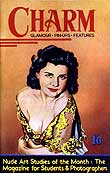 Charm (issue 4) with glamour, pin-ups and features 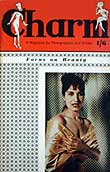 Charm (issue 24) |
Charm [closed]Modern Fiction (London) Ltd, 6 Morwell St, WC1. Ed: Al Hyde. Printed by EHT (Printers) London N7.1956-? (at least 28 issues). Small format (4.75in x 7.25in) Nude art studies of the month: The magazine for students and photographers. Also published film studio shots. Issue 4 here from 1956 ran pin-ups of Gina Lollobrigida, Felicia Farr (later married to US actor Jack Lemmon), Ludmilla Tcherina and Jane Russell. 34pp. |
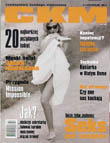 CKM: the name of was inspired by a machine gun (and it sounds a bit like FHM) |
CKM (Poland)Verlagsgruppe Jurg Marquard, August/September 1998Munich-based German group Verlagsgruppe Jurg Marquard launched CKM in Poland. The name comes, just like Maxim, from a type of machine gun, suiting the macho, lads magazine image. VJM runs franchises such as Cosmopolitan and Playboy in Germany, Austria, Switzerland, Poland and Hungary also. |
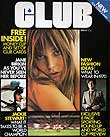 Club: Jane Birkin on the first issue cover (March 1971) 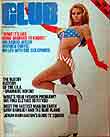 Club: Raquel Welch on the March 1971 cover. She was also to feature on the July cover that year 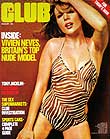 Vivien Neves on the August 1971 Club 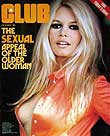 Brigitte Bardot on the October 1971 Club 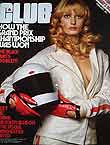 Club: last issue February 1972 |
Club [closed]IPC, monthly. June 1970-February 1972IPC tried to crack the men's market with Club – 'for today's man' and contents page pullers such as: 'If you don't swing – don't come in' and 'Come inside for a look at tomorrow today.' The contents page alternated between the title 'between the sheets' and 'key to the club'. Club featured topless photo shoots on its colour centre-spreads and often used actresses and models on its covers. Terry Hornet was editor and production was headed by Bridget Rowe – possibly the same woman who went on to edit Women's World (also under Hornett at Carlton) and later the Sunday Mirror and the People. Christopher Ward wrote a column. Issues were typically divided into four sections:
Club lasted just 21 issues. An editorial on the back page of the last issue ('Thank you and good night') claimed that about half a million men read Club each month, but only 80,000 bought it – too few to sustain the magazine. IPC's failure was seen as having wider repercussions: 'The shame is that Club's closing will probably make any other publisher wary of putting out a similar product for young men.' As can be seen in the Men's Magazine History, that statement was prophetic. Cover models included Jane Birkin (actress in 1966 film Blowup and singer of 'Je t'aime' with husband Serge Gainsbourg); Marsha Hunt (singer in Hair who posed nude for Patrick Lichfield on a Vogue January 1969 cover shot); Raquel Welch (twice); Vivien Neves (in 1971, the first nude model to appear in The Times, who contracted MS aged just 54); and Brigitte Bardot – with the cover line 'The sexual appeal of the older woman'. Bardot was also used as the cover model for the re-issue of Esquire in the UK in 1991.The January 1971 issue (which has a 1970 copyright because it was on the shelves in December 1970) featured a
6-page article with Michael Caine's byline. In it he described
how he had done the research for Get
Carter (though the film is just called
Carter in the article). It was based on interviews
with the man on whom he had based his character. 'I mean, between
you and mean,' says 'Jack Carter', 'I could have done porridge
for GBH more than once. But it's not like Al Capone when they were
running around with tommy-guns. Nothing like. Our firm is British
... It gets a gets a bit rough sometimes. But then life gets rough
sometimes, don't it.' Sounds more like Bob Hoskins' Harold in the Long
Good Friday. It was the only issue with a topless woman on
the cover.
Club International lives on as a top-shelf title (Paul Raymond). |
|
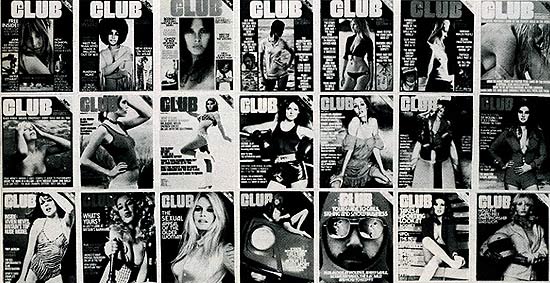
All 21 covers of Club magazine, from June 1970, top left,
to February 1972, bottom right. The image was scanned from the last
issue of the magazine. The 'New For today's man' flash in the top right
corner only dropped the New at issue 9 |
||
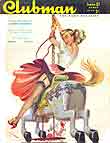 Clubman: March 1955 (issue 51) included four 3D images of circus acts |
Clubman [closed]Princedale Press, Pelican Passage, 128 Cambridge Heath Road, London E1. 1950?-1955?Short stories, cartoons and photographs in sub-A4 format. |
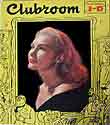 Clubroom: issue 38 (1953) included 3D images and glasses |
Clubroom [closed]Bayard Production Ltd produced this sub-A4 format title. 1950s |
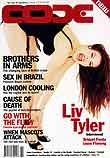 Code with Liv Tyler on the cover 'for men of substance' |
Code [closed]Monthly; Surcutus, Cornwall. November 2001-?The first issue of this magazine 'For men of substance' cost £3 for 132 pages under editor Nigel Pengally. Liv Tyler was interviewed and on the cover, with other interviewees Jane Fonda and Jason Flemyng, whose Snatch follow-up Rock Star had just come out. The web address was www.codemagazine.co.uk. |
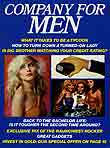 Company for Men December 1979 issue with 44 pages |
Company for Men [closed]National Magazine Co, London. 1979-80? Printed by Mondadori, Verona, ItalyFree A4-ish, stapled supplement with women's monthly magazine Company. The December 1989 issue shown here ran to 44 pages. The centre spread photo shoot – 'Blondie the raunchy rocker' – was of Debbie Harry Company profile |
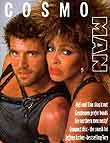 Cosmo
Man: banded supplement with women's glossy Cosmopolitan. 1985 cover shows Mel Gibson and Tina Turner in Mad Max Beyond Thunderdome |
Cosmo Man band-on [closed]National Magazine Company, 1984-89 (approx) |
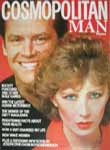 Cosmopolitan Man: the one and only standalone issue |
Cosmopolitan Man [closed]National Magazine Company, April 1978 (one issue) This cover shows
French actress Aurore Clément and Jack Nicholson and cost 50p. There were no more issues. However, Cosmo
Man
was later published as a section inside Cosmopolitan and
then as a banded supplement (at least until 1989). |
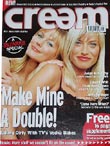 Cream,
a men's magazine from John Brown as a Bizarre special |
Cream [closed]John Brown, December 1988-?The publisher of Bizarre came up with this special 'for men with bottle'. John Brown profile |
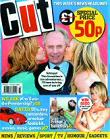 Cut: Bauer's attempt at a weekly men's magazine lasted just three months |
Cut [closed]H Bauer, 12 August 2004-11 November 2005 (on sale Thursday)The German publisher behind popular women's weeklies Take a Break and Bella tried to break into a different market with Cut. Reports put its investment at £8 million. Simon Geller, former editor of Men's Health, headed the title. TV advertising backed the launch, which the company must have seen as a mass-market title, into the booming men's weekly sector being created by IPC and Emap. The first issue was priced at just 50p, rising to £1. It took a different approach from IPC and Emap on the day that official circulation figures showed Nuts and Zoo averaged half-a-million sales a week in their first six months. The new title took 'the best' from newspapers and magazines (including Emap's Zoo!). This strategy had been used for several years by Dennis with The Week and the Guardian with its Editor supplement. The first issue culled from 54 papers and 185 mags for a mix of news, humour, gadgets, quizzes, sport, cars and, of course, women, although the flesh count was refreshingly low. However, in October, Marketing Week reported that Bauer had stopped taking any advertising for Cut (14 October 2004, p15), and was rumoured to be gearing up for a relaunch. By November, Press Gazette saw 25 editorial jobs under threat as Bauer said it was reviewing the future of the title (11 November).The issue published on 11 November was the last. Print Week said sales had fallen to just 10,000 after an initial print run, believed to have been about 700,000 copies, at Quebecor World in Corby (25 November, p9). 'It has been criticised for the poor quality of paper on which it was printed and the editorial content, which aimed to tone down the "booze and birds" focus of its rivals,' said Print Week. The Brand Republic website ('Cut fails to make it as Bauer pulls plug on men's weekly,' 10 December) said Bauer blamed a 'highly competitive and promotionally led market'. David Goodchild, managing director of Bauer, was quoted as saying: 'Cut was an exploration of new territory for the company. The intent was to provide men with an alternative weekly read to the lad's weeklies.' Brand Republic said unofficial industry figures put sales of the first full-price issue at just 30,000.Geller went on edit Sky, the free magazine for the 7 million subscribers to the satellite TV channel, at customer publisher John Brown Citrus. H Bauer profile |



